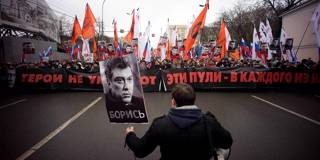The value of heroism is again on the rise, especially in countries where undemocratic regimes can no longer be relied on to deliver economic prosperity. The future may well lie not with politicians and diplomats, but with those men – and women – who are willing to die.
LONDON – Recently I watched The Man Who Was Too Free, a moving documentary about the Russian dissident politician Boris Nemtsov, who was gunned down in front of the Kremlin in 2015. A young, handsome rising political star in the 1990s, Nemtsov later refused to bend to Russian President Vladimir Putin’s authoritarianism and went into opposition, where he was harassed, imprisoned, and finally killed. The film left me thinking about the diminished role of heroism and courage in modern life, and also about the fate of Russia.
Heroism is a product of extreme situations – classically, involving war and violence. Because today’s Western way of life is non-extreme, the value of heroism has fallen. But its stock is rising in most of the rest of the world, including Russia.
The hero is both noble and self-destructive. He or she not only prefers an honorable death to a dishonorable life, but also would rather die young and gloriously than spin out a long and compromised existence loaded with easily gotten (and forgotten) honors. Hector in Homer’s Iliad says: “’Tis true I perish, yet I perish great.” The heroic life is inherently tragic; immortality is its only reward.

LONDON – Recently I watched The Man Who Was Too Free, a moving documentary about the Russian dissident politician Boris Nemtsov, who was gunned down in front of the Kremlin in 2015. A young, handsome rising political star in the 1990s, Nemtsov later refused to bend to Russian President Vladimir Putin’s authoritarianism and went into opposition, where he was harassed, imprisoned, and finally killed. The film left me thinking about the diminished role of heroism and courage in modern life, and also about the fate of Russia.
Heroism is a product of extreme situations – classically, involving war and violence. Because today’s Western way of life is non-extreme, the value of heroism has fallen. But its stock is rising in most of the rest of the world, including Russia.
The hero is both noble and self-destructive. He or she not only prefers an honorable death to a dishonorable life, but also would rather die young and gloriously than spin out a long and compromised existence loaded with easily gotten (and forgotten) honors. Hector in Homer’s Iliad says: “’Tis true I perish, yet I perish great.” The heroic life is inherently tragic; immortality is its only reward.